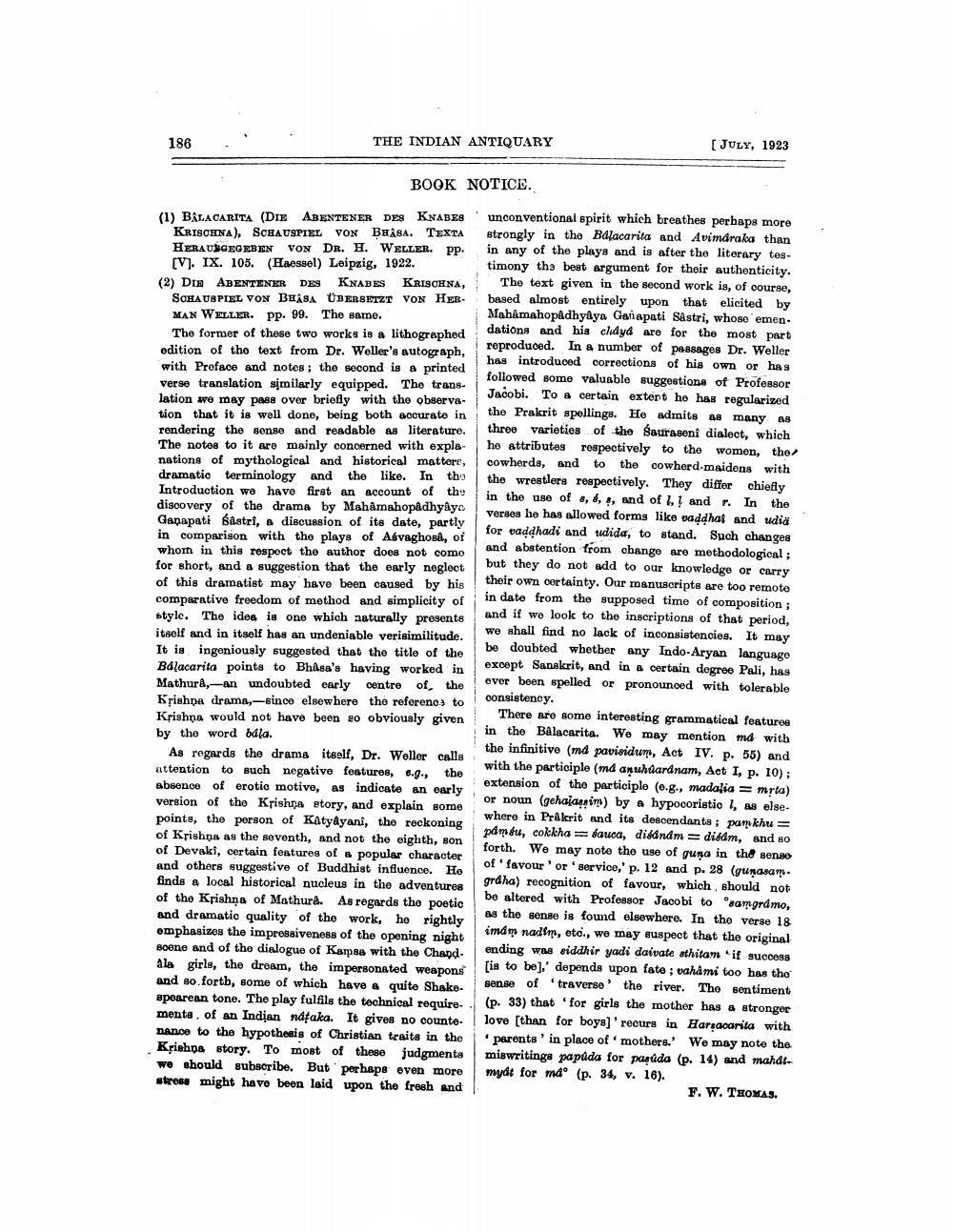________________
186
.
.
THE INDIAN ANTIQUARY
[JULY, 1923
BOOK NOTICE.
(1) BALACARITA (DIE ABENTENER DES KNABES unconventional spirit which breathes perhaps more
KRISHNA), SCHAUSPIEL VON BH8A. TEXTA strongly in the Balacarita and Avimdraka than HERAUSGEGEBEN VON DR. H. WELLER. Pp. in any of the plays and is after the literary tos[V]. IX. 105. (Haessel) Leipzig, 1922,
timony tha best argument for their authenticity. (2) Dis ABENTENER DES KNABES KRISCHNA, The text given in the second work is, of course,
SCHAUSPIEL VON BESA UBERSETZT VON HER based almost entirely upon that elicited by MAN WELLER. Pp. 99. The same.
Mahamahopadhyâya Ganapati Sastri, whose emen.
dations and his chdyd are for the most part The former of these two works is a lithographed edition of the text from Dr. Weller's autograph,
reproduced. In a number of passages Dr. Weller
has introduced corrections of his own or has with Proface and notes; the second is a printed
followed some valuable suggestions of Professor verse translation similarly equipped. The trans
Jacobi. To a certain extent he has regularized lation we may pass over briefly with the observa
the Prakrit spellings. He admits as many AS tion that it is well done, being both accurato in rendering the sonse and readable as literature. three varieties of the Sauraseni dialect, which The notes to it are mainly concerned with expla- he attributes respectively to the women, the nations of mythological and historical mattere, cowherds, and to the cowherd maidons with dramatic terminology and the like. In the the wrestlers respectively. They differ chiefly Introduction we have first an account of the
in the use of 6, 4, 5, and of l and . In the discovery of the drama by Mahamahopadhyaya
verses he has allowed forms like paddhat and udiä Ganapati fastri, & discussion of its date, partly
for vaddhadi and adida, to stand. Such changes in comparison with the plays of Asvaghos, of
and abstention from change are methodological; whom in this respect the author does not como
but they do not add to our knowledge or carry for short, and a suggestion that the early neglect
his their own certainty. Our manuscripts are too remoto of this dramatist may have been caused by his
in date from the supposed time of composition ; comparative freedom of method and simplicity of style. The idea is one which naturally presents
and if we look to the inscriptions of that period, itself and in itself has an undeniable verisimilitude.
we shall find no lack of inconsistencies. It may
be doubted whether any Indo-Aryan language It is ingeniously suggested that the title of the
except Sanakrit, and in a certain degree Pali, has Bdsacarita points to Bhasa's having worked in
centre Mathura, an undoubted early
of
n the
ever been spelled or pronounced with tolerable
consistency. Krishna drama,-since elsewhere the refereno, to
There are some interesting grammatical features Krishna would not have been so obviously given
in the Balacarita. We may mention md with by the word bila.
the infinitive (md pavisidum, Act IV. p. 55) and As regards the drama itself, Dr. Weller calls
with the participle (md aṇuhdardnam, Act I, p. 10); attention to such negative features, 6.9., the absence of erotio motive, as indicate an early
extension of the participle (0.8., madalia = myta) version of the Krishra story, and explain some
or noun (gehalasim) by a hypocoristio l, s else
where in Prakrit and its descendants ; pamkhu = points, the person of Katyayani, the reckoning
pdmiu, cokkha dauca, dildndm =dilm, and so of Krishna as the seventh, and not the eighth, son of Devaki, certain features of
forth. Wo may note the use of guna in the sense
popular character and others suggestive of Buddhist influence. He
of 'favour or service,' p. 12 and p. 28 (gundafinds a local historical nucleus in the adventures
grdha) recognition of favour, which should not of the Krishna of Mathura. As regards the poetic
be altered with Professor Jacobi to samgrdmo, and dramatic quality of the work, he
as the sense is found elsewhere. In the verse 18
rightly omphasizes the impressiveness of the opening night
imdm nadimp, oto, we may suspect that the original soene and of the dialogue of Kamsa with the Chand
ending was siddhir yadi daivate sthitam if success ala girls, the dream, the impersonated weapons
[is to be],' depends upon fate ; vaha mi too has the and so forth, some of which have a quite Shake sense of "traverso' the river. The sentiment sponrean tone. The play fulfils the technical require..
(p. 33) that for girls the mother has a stronger mente, of an Indian nafaka. It gives no countelove [than for boys) ' recurs in Hargacarita with nance to the hypothesis of Christian traits in the parents' in place of mothers.' We may note the Krishna story. To most of these judgments miswritings papáda for paguda (p. 14) and mahdiwe should subscribe. But perhaps even more mydt for mdo (p. 34, v. 16). strese might have been laid upon the fresh and
F. W. THOMAS.




